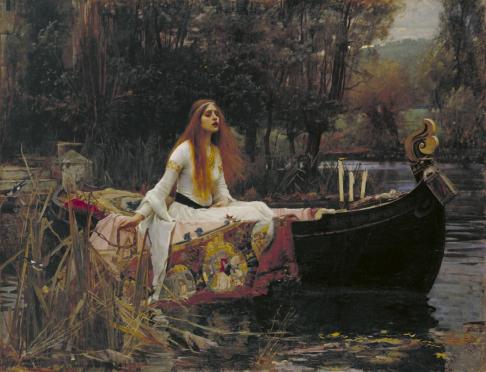Spring has finally sprung! Every daisy in the grass, every drop of spring rain, every velvety breeze promises excitement! My days will soon be filled with laughter and colourful clothes, reading on the window sill, daydreaming to the sounds of Psychedelia or Madchester music, ‘Lazing in the foggy dew‘, and endlessly strolling around.
 1872. Springtime – Claude Monet
1872. Springtime – Claude Monet
Arthur Rimbaud’s poem ‘Sensation‘, written in March 1870 when he was just sixteen years old, perfectly expresses a sense of freedom, excitement and being young. Along with Kerouac’s On the Road, this poem is the epitome of freedom, at least for me.
Sensation is Rimbaud’s rapturous dream of escaping into nature which was his main inspiration. Nature represented a wellspring of freedom and inalienable love at the same time. In Rimbaud’s eyes Nature was Venus, his love inspiration to whom he dedicated his poem Sun and Flesh (Credo in Unam). Poem ‘Sensation’ evokes sensuous freshness of Rimbaud’s early verses which were written while he still lived in a small town of Charleville. Life in the province suffocated Arthur Rimbaud, an intelligent and eloquent young man, with eyes that a childhood friend described as ‘pale blue irradiated with dark blue—the loveliest eyes I’ve seen‘.
His father had already left the family, and his mother, Vitalie, was a dominant and pious woman, patronising young Arthur and depriving him from his freedom. In all of his early poems there’s a sense of longing for freedom, an enormous wish to fly away, venture into the unknown; a typical teenage rebellion and yearning for excitement. His poems are marked by revolt against traditional values; family, patriotism and Christianity. For young Rimbaud the only escape from that bleak world of tradition was to wander off into the woods, and idle in the shadow of trees, imagining Venuses, Nymphs and fatal women, while still as inexperienced as a sixteen year old lad can be. Fruit of his musings were poems such as Sensation, A Dream for Winter and Nina’s Replies (‘Seventeen! You’ll be so happy!/Oh! the big meadows/The wide loving countryside! – Listen, come closer!…‘), all of which have an aura of dreamy and idle afternoons. A woman is an adventure, an escape into solemnity of senses, and a realised love equals liberation from all constraints of society.
Strong desire to escape boredom which pervades Rimbaud’s early poems, and their mystical quality is a combination which makes them popular today still. Rimbaud’s poems were read and admired by many different artists, from Amedeo Modigliani to Richey Edwards. I can’t even put it in words what this poem means to me, how it enlightened me, inspired me! Memories of reading Rimbaud’s poems for the first time are still vivid in my mind. I remember the thrill, the passion, the tremble, the rapture I felt upon reading ‘Sensation‘ for the first time, then Season in Hell and Illuminations. I was reborn after discovering Rimbaud!
Ever since I read ‘Sensation’ for the first time, these verses stayed etched in my head (‘I shall not speak, I shall think about nothing:/But endless love will mount in my soul’). I know the poem by heart, and do not hesitate to recite it during one of my long, long walks, in the rain, in the sun, in the dusk; those are the moments when I really feel free, like a bird released from its cage.
Sensation
‘On the blue summer evenings, I shall go down the paths,
Getting pricked by the corn, crushing the short grass:
In a dream I shall feel its coolness on my feet.
I shall let the wind bathe my bare head.
I shall not speak, I shall think about nothing:
But endless love will mount in my soul;
And I shall travel far, very far, like a gipsy,
Through the countryside – as happy as if I were with a woman.‘
 1873. Reading by Berthe Morisot
1873. Reading by Berthe Morisot
His ‘genius, its flowering, explosion and sudden extinction, still astonishes‘.



Leave a comment